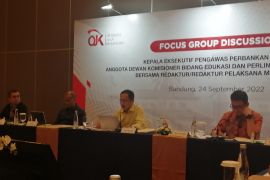OJK has decided to extend the credit restructuring period for debtors affected by COVID-19 until March 31, 2023. This rule was extended considering that debtors need a longer time to recover from the COVID-19 pandemic.Jakarta (ANTARA) - Micro, small, and medium enterprises (MSMEs) make up 72 percent of debtors whose credit has been restructured in July this year, according to the Financial Services Authority (OJK).
"In July 2021, the outstanding restructured credit dropped to around Rp779 trillion, with 5 million debtors, and 72 percent of them are MSME debtors," OJK banking supervisory chief executive Heru Kristiyana said at a webinar entitled 'Challenges After Credit Restructuring Relaxation Ends', originating from here on Tuesday.
According to Kristiyana, at the end of 2020, outstanding restructured credit reached around Rp914 trillion, with the number of debtors pegged at 7.8 million, most of whom were MSMEs. Although outstanding restructured credit fell to Rp779 trillion in July 2021, the amount is still considerable, he observed.
"It is still a concern because the impacts of the restructuring are significant and we need to look forward to it (plan to tackle them,"
Related news: Govt offering Rp400 bln in ultra microcredit to MSMEs
The OJK has decided to extend the credit restructuring period for debtors affected by COVID-19 until March 31, 2023, he informed. The extension was made considering that debtors will need a longer time to recover from the COVID-19 pandemic, he highlighted.
At the same time, he added, the OJK has asked banks to implement risk management and the precautionary principle in restructuring credit. Kristiyana said he has also requested banks to conduct self-assessments for debtors whose credit is worth restructuring.
Furthermore, he said, banks are required to create provisions for Impairment of Credit Losses.
"It turns out that bankers are obedient, and if you examine the history, Impairment of Credit Losses continues to be formed to face the possibility of restructuring. The precautionary principle already emerges and needs to be supported and sustained when the stimulus ends," Kristiyana explained.
Moreover, he asked banks splitting dividends to consider their capital resilience. He advised that some of the capital be used to provide for Impairment of Credit Losses.
Banks are also required to calculate and anticipate the impact of credit restructuring periodically, he added.
Related news: OJK records banking credit growth of 0.5% in July
Translator: Sanya S, Kenzu T
Editor: Suharto
Copyright © ANTARA 2021












